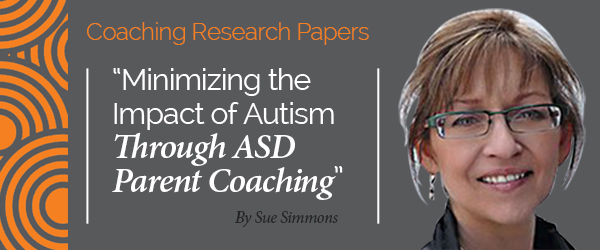Research Paper By Sue Simmons
(Life Coaching & Family Coach, CANADA)
Background:
Despite years of increased awareness, advocacy and funding, people with ASD are still marginalized in our society. Less than 12% obtain any kind of jobs, and less than 5% live independently. Real friendships are rare, and marriages almost non-existent. After 30 years our basic approaches to people with ASD have remained unchanged – despite incontrovertible proof that the great majority of people diagnosed with the condition have normal potential.[1]
Having a child with ASD is incredibly challenging. Most of us know at least one family affected by autism. I’ve experienced it firsthand. My son was diagnosed with Asperger’s Syndrome at the age of 5. The years leading up to, and immediately following his diagnosis, were the darkest days of my life. As a woman and Mom, I suffered terribly. The impact on my entire family was immense and pervasive.
It’s near impossible to parent a child on the spectrum as you would a typical child. This is a result of the child’s neural makeup, and the ensuing “gaps” in his or her development. Challenges in information processing, sensory and other difficulties cause individuals to struggle with anxiety and “fight or flight” reactions on an ongoing basis.
In general terms, the following challenges emerge between parent and child:
Parents feel chronically helpless and frustrated. They often believe they have failed, although their predicament likely has little to do with them as parents. The best-read, most patient and resourceful parents would likely be little further ahead.
However, this need not be the case with effective intervention, parent willingness and skilled support. Research is beginning to support the efficacy of parent involvement in ASD treatments, demonstrating that these challenges can slowly be remediated. In this article, I will outline the process of rebuilding a healthy parent-child relationship. It is through establishing this critical early partnership between parents and child, that the door to furthering a child’s cognitive development exists. Essential coaching skills, critical knowledge in child development and brain neuroplasticity, and personal experience as a parent of an ASD child make this a reality.
Why and how ASD Coaching is beneficial for parents:
Parents benefit tremendously from ASD Coaching. Here are just some of the positive ramifications:
